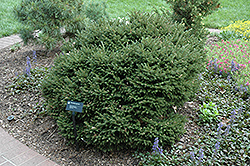It's all about ...
plants

Shadow's Broom Dwarf Serbian Spruce
Picea omorika 'Shadow's Broom'
Height: 5 feet
Spread: 5 feet
Sunlight:
![]()
![]()
Hardiness Zone: 3b
Description:
A small, dense mounded shrub, very unlike the species; forms a neat compact and upright evergreen ball, needles are deep green and glossy; quite adaptable, excellent choice for form and texture in the garden composition, justifiably popular
Ornamental Features
Shadow's Broom Dwarf Serbian Spruce is a dwarf conifer which is primarily valued in the landscape or garden for its ornamental globe-shaped form. It has attractive dark green evergreen foliage which emerges light green in spring. The glossy needles are highly ornamental and remain dark green throughout the winter.
Landscape Attributes
Shadow's Broom Dwarf Serbian Spruce is a dense multi-stemmed evergreen shrub with a more or less rounded form. Its relatively fine texture sets it apart from other landscape plants with less refined foliage.
This is a relatively low maintenance shrub. When pruning is necessary, it is recommended to only trim back the new growth of the current season, other than to remove any dieback. It has no significant negative characteristics.
Shadow's Broom Dwarf Serbian Spruce is recommended for the following landscape applications;
- Mass Planting
- General Garden Use
Planting & Growing
Shadow's Broom Dwarf Serbian Spruce will grow to be about 5 feet tall at maturity, with a spread of 5 feet. It tends to fill out right to the ground and therefore doesn't necessarily require facer plants in front, and is suitable for planting under power lines. It grows at a slow rate, and under ideal conditions can be expected to live for 50 years or more.
This shrub does best in full sun to partial shade. It does best in average to evenly moist conditions, but will not tolerate standing water. It is not particular as to soil type or pH. It is quite intolerant of urban pollution, therefore inner city or urban streetside plantings are best avoided, and will benefit from being planted in a relatively sheltered location. Consider applying a thick mulch around the root zone in winter to protect it in exposed locations or colder microclimates. This is a selected variety of a species not originally from North America.
This plant is not reliably hardy in our region, and certain restrictions may apply; contact the store for more information.
